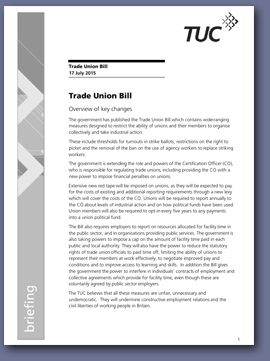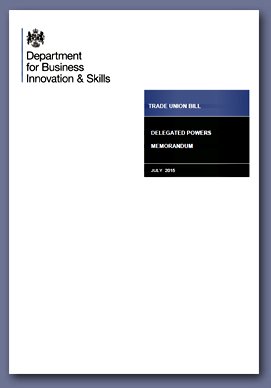 |
 |
|
On the face of it, the Trade Union Bill going through Parliament at the moment will infect all Trade Unions with a terminal illness and spells the end of workers rights in this country. The Bill covers the following areas: Clauses 2 and 3 make provisions for ballot thresholds for industrial action. Any action by a trade union will need a 50% turnout requirement, there will be an additional 40% support requirement in important public services in six key sectors. Clauses 4 to 6 make provisions about information requirements relating to industrial action including: changes to the information requirements on the ballot paper by requiring detail on the nature of the dispute and the type of industrial action to be taken, alongside a general indication of the time period for action; makes changes to the notice of ballot results provided to members and employers; and imposes new annual reporting requirements to the Certification Officer (‘CO’). Clauses 7 and 8 contain provisions about the timing and duration of industrial action. Two weeks’ notice is to be given to employers of industrial action (rather the current period of one week). In addition the mandate for industrial action is to expire four months after the date of ballot. Clause 9 requires union supervision of picketing – a number of provisions in the statutory Code of Practice on Picketing are to become legal obligations in the Bill. Clauses 10 and 11 make provision in relation to the payment of funds for political objects. The clauses will require a union member to actively decide to contribute a proportion of their membership subscription to the union’s political fund. A union member will also be required to renew the decision to contribute (to the political fund) every 5 years. Where the annual amount spent on political expenditure is over £2,000, unions will be required to provide details of expenditure in their annual returns. Clauses 12 and 13 will introduce two new regulation making powers. The first allows a Minister of the Crown to make regulations which require some or all public sector employers with one or more trade union representatives to publish information relating to time off taken by those representatives for trade union duties and activities. The second allows a Minister of the Crown to make regulations exercising reserve powers for the purpose of applying a statutory cap to relevant public sector employers, where the Minister considers it appropriate to do so having regard to information published in accordance with publication requirements. Clauses 14 to 16 expand the role of the Certification Officer. These provisions will allow the Certification Officer to investigate and enforce breaches of statutory requirements without having to act upon a complaint from union members and where there has been a breach the Certification Officer will have the power to impose financial penalties (or warn of their use if certain action is not taken). Clause 17 makes provision regarding a levy. This clause contains a regulation making power which will enable the Secretary of State to make affirmative regulations to provide for trade unions and employer associations to pay for the full recovery of the costs of running the Certification Office. Clauses 18 to 22 contain general provisions including minor and consequential amendments to other enactments, the extent, commencement and title. Schedule 1 – Investigatory powers of the CO: Schedule to be inserted into the 1992 Act. The information that could be required to be published includes the number of such representatives by type, time spent on trade union duties and activities, and details of the employers’ spending on trade union duties and activities. Clause 17: Power to impose levy This is in effect making Trade Unions pay for the time taken by the Certification Officer to investigate that Trade Union! The regulations may make provisions for determining the following: amount of levy payable including by reference to the relevant trade union, by reference to a specified criteria (amount of members or income of the organisations, type of organisation and the different proportion of the CO’s expenses that are referable to each organisation) and what is to count as expenses by the CO. The full document which is out for consultation can be downloaded here The Trade Union Bill in full can be downloaded here The TUC have issued a guidance to the Trade union Bill which can be downloaded here The government is consulting on a number of issues connected with the Trade Union Bill: Source: Gov.UK |

